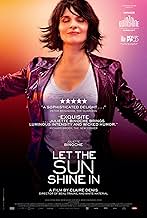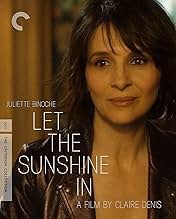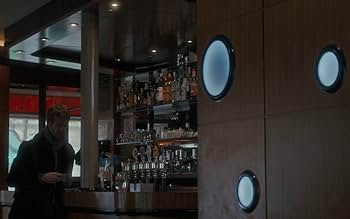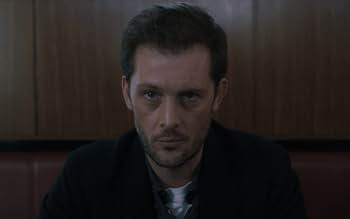IMDb-BEWERTUNG
6,0/10
8169
IHRE BEWERTUNG
Isabelle, eine Künstlerin aus Paris und geschiedene Mutter, ist auf der Suche nach der Liebe, der wahren Liebe.Isabelle, eine Künstlerin aus Paris und geschiedene Mutter, ist auf der Suche nach der Liebe, der wahren Liebe.Isabelle, eine Künstlerin aus Paris und geschiedene Mutter, ist auf der Suche nach der Liebe, der wahren Liebe.
- Regie
- Drehbuch
- Hauptbesetzung
- Auszeichnungen
- 2 Gewinne & 13 Nominierungen insgesamt
Empfohlene Bewertungen
I don't think the people giving this a 1/10 went into this with realistic expectations. This is French cinema, it's going to be sad and harsh and difficult and the character likely won't come to a concrete and obvious realization leading to her happiness. This movie does not hold your hand, but it is well worth it for those willing to look deeper into their emotional history to see what it is reaching for. There are some conversations that don't land but a lot do because Juliette Binoche gives a stellar performance. This is the type of character study that most actresses wait their whole life to do, she's a volcano of emotions bubbling under the surface for the whole runtime. Her character is probably a "bad person". She dates several married men, but that does not invalidate her problems. This movie is about the idea that chasing perfection can often lead you down the wrong path in your relationships and lead to a fear of commitment. For anyone who finds it difficult to be swept off your feet and easily believe in the rest of your life with someone, this is the movie for you. If you think the title of the film is a task that is easy to achieve, maybe it isn't.
"You don't have to go looking for love when it's where you come from" - Werner Erhard
Isabelle (Juliet Binoche, "Ghost in the Shell"), a divorced fiftyish artist, is attractive, urbane, and highly intelligent but her relationships seem to have a built-in mechanism for self destruction. The men in Isabelle's life offer her little except temporary physical pleasure and are pretty much ciphers (and not very nice ones at that). Loosely based on Roland Barthes' book "A Lover's Discourse: Fragments" with a screenplay by Christine Angot, Claire Denis' sophisticated comedy/drama Let the Sunshine In (Un beau soleil intérieur) is lighter fare than normal for Denis, but it has its probing, self-reflective moments and Juliet Binoche, as usual, is an appealing screen presence.
Like many of us, Isabelle wants to find someone who fits her pictures but, as most of us discover sooner or later, life often does not fit our pictures. All of Isabelle's relationships start out to be very promising but eventually the decisions she makes about her partners seem to get in the way of her satisfaction. Whatever she thinks that she is looking for, she does not find it with either banker Vincent (Xavier Beauvois, "Django"), actor (Nicolas Duvauchelle, "Wedding Unplanned"), ex-husband Francois (Laurent Gréville, "A Perfect Man"), or any other potential beau for that matter. The film begins with Isabelle in bed with the married, pretentious Vincent. Things are looking a-ok until she decides that he is taking too long to climax, a fact she decides reflects badly on her.
Vincent asks her whether she has had more success with other lovers, but her response is a convincing slap in the face. She is with him when he bullies a bartender but she does not react. The next time he visits her in her apartment, however, she calls him an unrepeatable name, then tells him to leave and not come back. Instead, she hooks up with a young actor (Duvauchelle), also married, though with a better disposition. When she invites him in for a drink, they play endless games about whether he should stay or leave. When he decides to stay, they go through the motions together but by the next morning he concludes that things were better before they had sex and wishes that it had not happened.
The next one up is François (Gréville), Isabelle's ex-husband, who is concerned about their ten-year-old daughter after she tells him that her mother cries every night. This is not good news for her to hear and she uses it as a reason to end any chance for reconciliation. There are several more suitors that follow but Isabelle always finds something about them that she dislikes. She meets Sylvain (Paul Blain, "All is Forgiven") at a club who literally carries her away with pleasure as they dance to Etta James' beautiful "At Last." Unfortunately, Fabrice (Bruno Podalydès, "Chocolat"), an art gallery owner, convinces her that Sylvain is wrong for her because he is not a good fit for her circle. This provides cover for her to end yet another relationship, one that had barely even begun. There is not much left for her of course but to go to a clairvoyant (Gerard Depardieu, "You Only Live Once"), but his banter provides little certainty that she will find "the one." There are times in Let the Sunshine In when Isabelle has moments of happiness and optimism, but she can also come across as needy and, at times, almost desperate. Through the magic of Binoche's performance, Isabelle is a sympathetic figure and one that we root for. Her quest, however, has a touch of game playing to it and it seems that, for Isabelle, it may not be whether you win or lose but how you play the game.
Isabelle (Juliet Binoche, "Ghost in the Shell"), a divorced fiftyish artist, is attractive, urbane, and highly intelligent but her relationships seem to have a built-in mechanism for self destruction. The men in Isabelle's life offer her little except temporary physical pleasure and are pretty much ciphers (and not very nice ones at that). Loosely based on Roland Barthes' book "A Lover's Discourse: Fragments" with a screenplay by Christine Angot, Claire Denis' sophisticated comedy/drama Let the Sunshine In (Un beau soleil intérieur) is lighter fare than normal for Denis, but it has its probing, self-reflective moments and Juliet Binoche, as usual, is an appealing screen presence.
Like many of us, Isabelle wants to find someone who fits her pictures but, as most of us discover sooner or later, life often does not fit our pictures. All of Isabelle's relationships start out to be very promising but eventually the decisions she makes about her partners seem to get in the way of her satisfaction. Whatever she thinks that she is looking for, she does not find it with either banker Vincent (Xavier Beauvois, "Django"), actor (Nicolas Duvauchelle, "Wedding Unplanned"), ex-husband Francois (Laurent Gréville, "A Perfect Man"), or any other potential beau for that matter. The film begins with Isabelle in bed with the married, pretentious Vincent. Things are looking a-ok until she decides that he is taking too long to climax, a fact she decides reflects badly on her.
Vincent asks her whether she has had more success with other lovers, but her response is a convincing slap in the face. She is with him when he bullies a bartender but she does not react. The next time he visits her in her apartment, however, she calls him an unrepeatable name, then tells him to leave and not come back. Instead, she hooks up with a young actor (Duvauchelle), also married, though with a better disposition. When she invites him in for a drink, they play endless games about whether he should stay or leave. When he decides to stay, they go through the motions together but by the next morning he concludes that things were better before they had sex and wishes that it had not happened.
The next one up is François (Gréville), Isabelle's ex-husband, who is concerned about their ten-year-old daughter after she tells him that her mother cries every night. This is not good news for her to hear and she uses it as a reason to end any chance for reconciliation. There are several more suitors that follow but Isabelle always finds something about them that she dislikes. She meets Sylvain (Paul Blain, "All is Forgiven") at a club who literally carries her away with pleasure as they dance to Etta James' beautiful "At Last." Unfortunately, Fabrice (Bruno Podalydès, "Chocolat"), an art gallery owner, convinces her that Sylvain is wrong for her because he is not a good fit for her circle. This provides cover for her to end yet another relationship, one that had barely even begun. There is not much left for her of course but to go to a clairvoyant (Gerard Depardieu, "You Only Live Once"), but his banter provides little certainty that she will find "the one." There are times in Let the Sunshine In when Isabelle has moments of happiness and optimism, but she can also come across as needy and, at times, almost desperate. Through the magic of Binoche's performance, Isabelle is a sympathetic figure and one that we root for. Her quest, however, has a touch of game playing to it and it seems that, for Isabelle, it may not be whether you win or lose but how you play the game.
I don't recall any other time when I related with a protagonist in a film this much. Every aspect of the lead character, Isabelle was portraying me ...some much so that I felt 'naked' emotionally. Claire Denis is a living legend. Juliette Binoche is an amazing actress...definitely a performance worthy of an Oscar
... in its focus on unsatisfactory relationships - and it even has Depardieu in a pointless cameo role!
At one level, it's not too surprising that a well-regarded female artist of a certain age would have trouble finding a suitable partner following her divorce. However, her inability does seem at least somewhat self-inflicted, as she keeps latching on to married and otherwise unavailable men - some of whom are clearly complete arseholes. Indeed, there were so many of these I lost track of who was supposed to be "just a friend" and who was her current lover, and what might happen in her future.
Worth a look, but not Binoche's best, IMHO.
At one level, it's not too surprising that a well-regarded female artist of a certain age would have trouble finding a suitable partner following her divorce. However, her inability does seem at least somewhat self-inflicted, as she keeps latching on to married and otherwise unavailable men - some of whom are clearly complete arseholes. Indeed, there were so many of these I lost track of who was supposed to be "just a friend" and who was her current lover, and what might happen in her future.
Worth a look, but not Binoche's best, IMHO.
I hadn't seen a preview or even read a precis before going, but I generally like French movies, so I went. I didn't know what to make of it -- at the beginning I thought it was a drama, but then the scenes got absurdly exaggerated, and I decided it must be a comedy that the language barrier kept me from finding funny. So I was surprised to learn from the reviews here that it was not a comedy! I still don't know what to make of it. So, my advice is, if you have to pay money to see this and you don't speak fluent French, don't bother (in my case, I have a theater membership that allows me pretty much unlimited movies, so I do tend to take chances).
Wusstest du schon
- WissenswertesThis film is part of the Criterion Collection, spine #976.
- Crazy CreditsClosing credits are seen over a therapy session with David and Isabelle.
Top-Auswahl
Melde dich zum Bewerten an und greife auf die Watchlist für personalisierte Empfehlungen zu.
- How long is Let the Sunshine In?Powered by Alexa
Details
- Erscheinungsdatum
- Herkunftsländer
- Offizielle Standorte
- Sprache
- Auch bekannt als
- Meine schöne innere Sonne - Isabelle und ihre Liebhaber
- Drehorte
- Paris, Frankreich(Main Location)
- Produktionsfirmen
- Weitere beteiligte Unternehmen bei IMDbPro anzeigen
Box Office
- Budget
- 2.978.000 € (geschätzt)
- Bruttoertrag in den USA und Kanada
- 892.421 $
- Eröffnungswochenende in den USA und in Kanada
- 39.699 $
- 29. Apr. 2018
- Weltweiter Bruttoertrag
- 4.192.590 $
- Laufzeit1 Stunde 34 Minuten
- Farbe
- Seitenverhältnis
- 1.66 : 1
Zu dieser Seite beitragen
Bearbeitung vorschlagen oder fehlenden Inhalt hinzufügen

Oberste Lücke
What is the streaming release date of Meine schöne innere Sonne (2017) in Australia?
Antwort


































